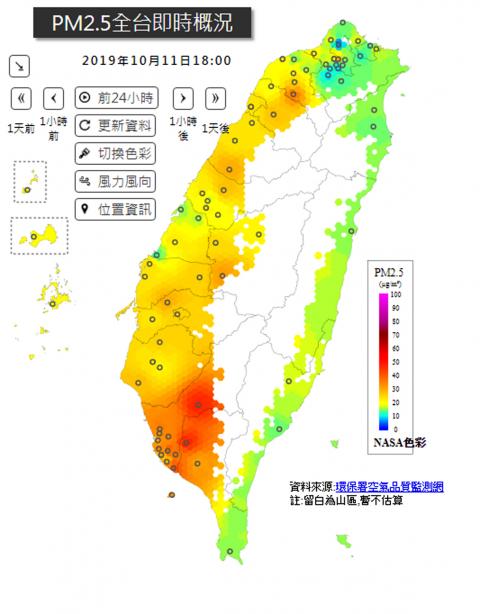Traces of plasticizers have been found in the nation’s air pollution, possibly from plastic in clothes and other products in daily use, a survey commissioned by the Environmental Protection Administration showed.
A team led by National Central University environmental engineering professor Lee Chung-te (李崇德) was commissioned by the agency to monitor and analyze the components of fine particulate matter.
From December 2017 to November last year, the team collected samples every six days from air quality monitoring stations in New Taipei City’s Banciao District (板橋), Jhongming (忠明) near National Taichung Special Education School, Yunlin County’s Douliou City (斗六), Chiayi City, Kaohsiung’s Siaogang District (小港) and Hualien City.

Photo: screen grab from the Environmental Protection Administration Web site
The stations were chosen as they reflect the different air pollution levels in northern, central and southern Taiwan, which could then be compared with the better air quality in Hualien, Lee said.
The team found that levels of PM2.5 — fine particulate matter measuring 2.5 micrometers or smaller — steadily increased from the east and north to central and southern regions, he said.
Sulfur oxide levels were higher in southern regions, possibly due to emissions by nearby factories, while sulfur oxide levels in the north were mainly produced by vehicles, he said.
The air pollution in Hualien and Taichung mainly resulted from regional sources; that in Kaohsiung was from local sources; while local and regional sources accounted for the pollution in Banciao, Douliou and Chiayi, the team found.
Nearly 20 percent of the pollutants in each sample were from overseas sources, the team said.
The team detected low levels of plasticizers, highlighting the need for more measures to curtail single-use plastic products, Lee said.
The plasticizers could have come from clothes and other plastic products, and more investigation is needed to clarify the causes and effects, he said.
The team also found increased amounts of nitrogen compounds, he added.
In addition to damaging the human reproductive and endocrine systems, human intake of plasticizers is also related to cardiovascular disease, a study in May by a team led by National Taiwan University Hospital’s Su Ta-chen (蘇大成) showed.
Department of Environmental Monitoring and Information Management Director-General Chang Shuenn-chin (張順欽) said that Lee’s study showed that nitrates increase more than other pollutants when PM2.5 concentrations are higher, mainly because of factory boilers, agricultural waste and vehicle emmissions.
There pollutants take longer to disperse under particular weather conditions, he said.
Nitrates are also produced in chemical interactions of volatile organic compounds and nitrogen oxides, which would be the focus of the agency’s pollution control measures, he added.

NEXT GENERATION: The four plants in the Central Taiwan Science Park, designated Fab 25, would consist of four 1.4-nanometer wafer manufacturing plants, TSMC said Taiwan Semiconductor Manufacturing Co (TSMC, 台積電) plans to begin construction of four new plants later this year, with the aim to officially launch production of 2-nanometer semiconductor wafers by late 2028, Central Taiwan Science Park Bureau director-general Hsu Maw-shin (許茂新) said. Hsu made the announcement at an event on Friday evening celebrating the Central Taiwan Science Park’s 22nd anniversary. The second phase of the park’s expansion would commence with the initial construction of water detention ponds and other structures aimed at soil and water conservation, Hsu said. TSMC has officially leased the land, with the Central Taiwan Science Park having handed over the

The Philippines is working behind the scenes to enhance its defensive cooperation with Taiwan, the Washington Post said in a report published on Monday. “It would be hiding from the obvious to say that Taiwan’s security will not affect us,” Philippine Secretary of National Defense Gilbert Teodoro Jr told the paper in an interview on Thursday last week. Although there has been no formal change to the Philippines’ diplomatic stance on recognizing Taiwan, Manila is increasingly concerned about Chinese encroachment in the South China Sea, the report said. The number of Chinese vessels in the seas around the Philippines, as well as Chinese

AUKUS: The Australian Ambassador to the US said his country is working with the Pentagon and he is confident that submarine issues will be resolved Australian Ambassador to the US Kevin Rudd on Friday said that if Taiwan were to fall to China’s occupation, it would unleash China’s military capacities and capabilities more broadly. He also said his country is working with the Pentagon on the US Department of Defense’s review of the AUKUS submarine project and is confident that all issues raised will be resolved. Rudd, who served as Australian prime minister from 2007 to 2010 and for three months in 2013, made the remarks at the Aspen Security Forum in Colorado and stressed the longstanding US-Australia alliance and his close relationship with the US Undersecretary

‘WORLD WAR III’: Republican Representative Marjorie Taylor Greene said the aid would inflame tensions, but her amendment was rejected 421 votes against six The US House of Representatives on Friday passed the Department of Defense Appropriations Act for fiscal 2026, which includes US$500 million for Taiwan. The bill, which totals US$831.5 billion in discretionary spending, passed in a 221-209 vote. According to the bill, the funds for Taiwan would be administered by the US Defense Security Cooperation Agency and would remain available through Sept. 30, 2027, for the Taiwan Security Cooperation Initiative. The legislation authorizes the US Secretary of Defense, with the agreement of the US Secretary of State, to use the funds to assist Taiwan in procuring defense articles and services, and military training. Republican Representative